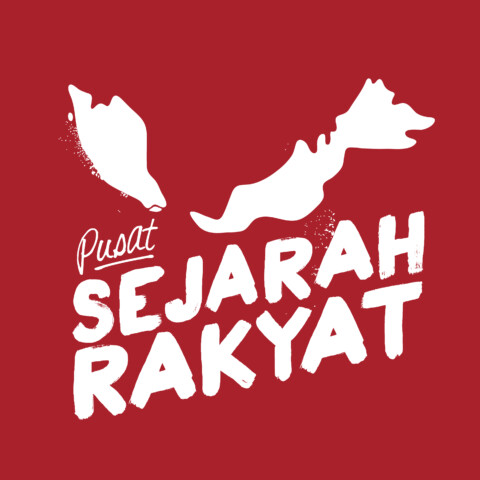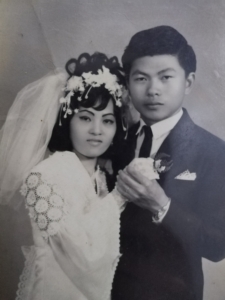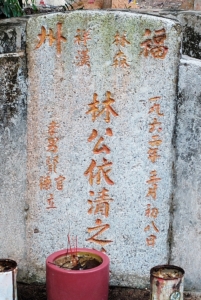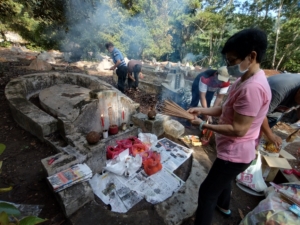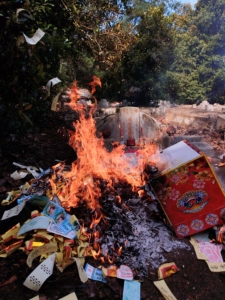- Introduction
Pengenalan - Transcript
Transkrip - Additional Resources
Rujukan Tambahan - Pictures
Gambar - Credits
Kredit
For our third installment of Suara ((( Pembangunan )))’s project, we are honoured to share Mah Jun Hoong sonic essay entitled “Unheard Voices and Unseen Distance”. Centering the voices of his grandparents in reflecting their Foochow family’s relocation from three different towns in Peninsular Malaysia, it traces the longing for a hometown and the dynamics of internal migration in tandem with political and economic development.
In contemplating the process of recording his family history, Jun Hoong mentions how he wants to capture the conversation “as normal, as simple as possible” and keep it as a “genuine part of our daily life”. This process of documentation, be it during Qingming festival and while driving through various mega infrastructures connecting different parts of Malaysia, provides a cathartic space for:
dialogue between us with our relatives, or maybe small talks or interviews with our loved ones to really know about their story, which is part of the bigger history…
Apart from that, Jun Hoong also asked multiple questions that deserve to be further discussed. How can the concept of distances and times be understood when we talk about migration and national development where:
A human needs to travel like 300 or 400 km (only to get) back to their hometown. To do the sembahyang (Qingming) and also because of economic reasons, we need to travel. So far so far away, like my parents (who) travel from Sitiawan to Singapore to work and then my brothers (and I) need to wake up early for school. So every time, I need to travel back. Why? Why should we go so far away to get a decent job and decent salary?
All in all, is it worth the trouble for us to keep moving to the marching drum of national development? How do our memories intertwine in the process? This audio essay might provide further questions to ask ourselves.
Suara ((( Pembangunan ))) is a collaboration between Dr. Aizuddin Mohamed Anuar (Lecturer in Education, Keele University) and Zikri Rahman (Programme Coordinator, Pusat Sejarah Rakyat) and is funded by Faculty Research Fund (FRF) 2023-2024, Faculty of Humanities and Social Sciences, Keele University.
What does development mean? Sky-scrapers? Modern and high tech lifestyle? No, as for me, development means distance, physical distance of loved ones, and emotional distance of one with another.
On the Ching Ming Festival this year, my grandparents, uncle, and I went back to my great grandfather, Ling Yi Ching’s 林依清 cemetery in Segari, Lumut, which is about half an hour from our “new” home in Sitiawan.
Both my mother and father’s families originated from Sitiawan, but my grandparents on my mother’s side moved from Sitiawan to Bukit Gombang, Raub in their 20s, then to Sri Jaya, and finally settled down in Kuantan till now. They have no relatives there.
My parents worked in Singapore and gave birth to three children there, I am the middle child. But we did not live in Singapore, nor are we Singapore citizens. I was raised in Skudai, Johor Bharu and my grandparents took care of me in Kuantan from the time I was born till I was 3 years old.
If you ask me, where is my hometown, I will tell you I have 3 hometowns, namely Skudai, Kuantan, and Sitiawan. These 3 cities seemed unrelated, but the goddess of history connected my family with these cities across the peninsular of Malaysia, in the name of development.
[sounds of waves]AUDIO
Transcript:
Mandarin
马:马俊泓
李:李月花(婆婆)
林:林显得(公公)
马:你出生两天就从树胶芭搬迁出来了吗?
李:我听大姨说,我出生之后半个月才搬出来新村,搬家到二条路路弯头新村这里。政府有给厝地让你们自己建板屋。
马:现在还有吗?那间板厝?
李:就在二舅公现在住的地方,以前住的板屋拆掉,改建新的屋子。妈咪出世的时候,屋子才改建(1974年)。我在家顾妈咪到四个月大才抱出去。
English
Mah: Mah Jun Hoong
Lee: Lee Ngok Wah (Grandma/Popo)
Ling:Ling Heng Teck (Grandpa/Gonggong)
Mah: Did you move out from the rubber plantation just two days after you were born?
Lee: According to my eldest sister, we moved to the new village at Simpang Dua, Sitiawan half a month after I was born. The government provided land to build your own wooden houses.
Mah: Is that wooden house still there?
Lee: It’s where our second great-uncle lives now. Then, the old wooden house was torn down and a new one was built. The house was rebuilt when my mom was born in 1974. I stayed home to look after my daughter until she was four months old before taking her back to Raub.
AUDIO
Mandarin
马:这里很多间这样的面粉厂吗?
李:只有一间啦,这间最出名了。
林:马来亚的面粉都来自这里。
马:你讲你小学的时候就有这间面粉厂了啊?
李:对啊,小学毕业老师带我们来这里参观。我小学毕业的时候才13岁。那时面粉厂刚建好,可以让你们参观,很大间。
English
Mah: Are there many flour mills like this one around here?
Lee: There’s only one. This one is the most famous.
Ling: All the flour in Malaya comes from here.
Mah: You said this flour mill was already here when you were in elementary school?
Lee: Yes, when I graduated from elementary school, the teacher brought us here for a visit. I was only 13 when I graduated. The flour mill had just been built and was open for tours. It was very large.
[sounds of waves]
While speeding across the Raja Permaisuri Bainun Segari Bridge, Popo pointed at a flour mill on the seashore. She said it was built after land reclamation. When she was 13 years old, they went to visit the mill as part of their graduation trip.
It was open to visitors back then, but not anymore. She also mentioned that there are still some rubber plantations nowadays, but many people chop down the rubber trees to plant oil palm trees.
Sometimes I wonder, is it necessary to leave and separate with our family and loved ones, to get a better life in another city or abroad? When we need to travel a thousand miles away, just to meet our family and pay tribute to our ancestors, is this what we want for the sake of development?
I have no answer, but I feel obligated to record the oral history of the people I love, and the neglected sound of development.
[sounds of waves]- “Getting By”: Class and State Formation among Chinese in Malaysia by Donald M. Nonini
https://www.jstor.org/stable/10.7591/j.ctt20d88vz
2. Spatial Aspects of Foochow Settlement in West Malaysia with Special Reference to Sitiawan, Perak, since 1902 by S.H. Khoo, G. Cho and K.E. Chan:
3. MCA helped Chinese community establish a place in Malaya by Chin Yee Mun:
- Mah Jun Hoong’s grandmother, Lee Ngok Wah and grandfather, Ling Heng Teck during their wedding day.
- The tombstone of Mah Jun Hoong’s great grandfather’s which inscribed his ancestral hometown in Minhou, Fuzhou, China.(福州闽侯县)
- Mah Jun Hoong’s grandmother (right) holding a large bundle of incense to worship their great grandfather during Qingming.
- Burning of a large amount of hell money and religious goods offered to Mah Jun Hoong’s great grandfather during Qingming.
Credits:
Audio Essay created, written, produced, and edited by Mah Jun Hoong
Voices
Narrator, Translation: Mah Jun Hoong
Interviewee, Grandmother: Lee Ngok Wah
Interviewee, Grandfather: Ling Heng Teck
Music and Sounds
Sound of Pasar: Mah Jun Hoong’s recording at Pasar Kampung Koh, Sitiawan
Sound of Waves
